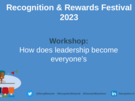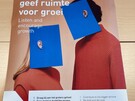@maaikeverbree, Hoofd academische zaken BETA-faculteit, Vrije Universiteit Amsterdam & @rolienwalinga, manager Leadership Development, Vrije Universiteit Amsterdam
Leadership is not a role, position or box to be ticked, but an everyday behavior that benefits you and others. It can be shown in small ways to make a valued difference. Are you looking for some concrete examples to operationalize leadership? Do you also find it a difficult challenge to bring all separate concepts of leadership, management, teamwork, behavior, culture change well into coherence across the stage? Come listening and discussing with us in the workshop ‘How does leadership become everyone’s’. In this workshop, Technische Universiteit Delft and Vrije Universiteit Amsterdam are pleased to take you through their quest how to make leadership both practical and recognizable, and in the meanwhile create commitment and common language. We worked out a similar premise about leadership, but translated it into different tools as Profile, Framework Management, Dialogue Game and Art of Engagement. We like to share these tools in the workshop with you.



Comments
Edited on 13 April 2023
The VU made a podcast series about The art of Engagement, you can find the link here (in Dutch)
Thank you @rolienwalinga for sharing the link to the EUR dilemma game on scientific integrity (via chat).
I will quote what you emphasized: 'It's a very nice tool to broaden a dialogue, but note that this is primarily about scientific integrity, rather than culture change/leadership.'
Here you can read a report from this workshop (with thanks to the reporter for making it):
The Vrije Universiteit Amsterdam has developed the leadership programme 'The Art of Engagement' as a handle on good leadership and teamwork. It is about the underlying values of leadership. Its creators call shared responsibility around leadership essential for a socially safe and healthy group dynamic within the academic culture. Divided into four groups, attendees were assigned ten minutes to have a conversation about one of the following accents to leadership:
It depends on character to what approach you can relate the best on what moment, but it’s all included. And it’s also recommended to be open about your personal quest in this context.
Most of us are aiming to link Recognition & Rewards to a culture change. There is already a lot that starts to move, but there also remain professors who stay on their own path in old-fashioned ways. How do we engage them? For example, by setting explicit criteria for desired leadership and make those criteria leading in nominations and evaluations. Participants noted that we all look to the theme leadership with a different scope. It’s important to point that out. You also have to be aware of that when you pass your vision on to younger generation. It is desirable to be clear on criteria: what is excellent teaching, what is excellent research? But: transparency is a big challenge. How do you bridge nationality-related cultural differences within a team?
Discuss how instead of what when you try to start a process of change. What is the scope of academics who do not manage a fixed defined team? A real team consists of eight to ten people, you can question whether a department is properly set up if it is set up differently.'
What are the main take aways of this session?
Thank you Johan for the condensed and adequate summary!
@inekevandervegt, @marwienketillema, @irenevanstaveren, @lucienne, @petruschkaschaafsma, @alisescerbinina, @markpeters, @ankenooijen, @stefanvandermeer, @gijskooistra, @mariekekleinbreteler, @fransvanheest, @floordriessen, @ellencapelkampkuiper, @philippedebock, @christienbakker, @annemiekbaars, @maaikeverbree thank you for joining this workshop. Hereby we share the report, the powerpoint and the podcast mentioned during the workshop. If you want to add your personal take away ass well, don't hesitate!